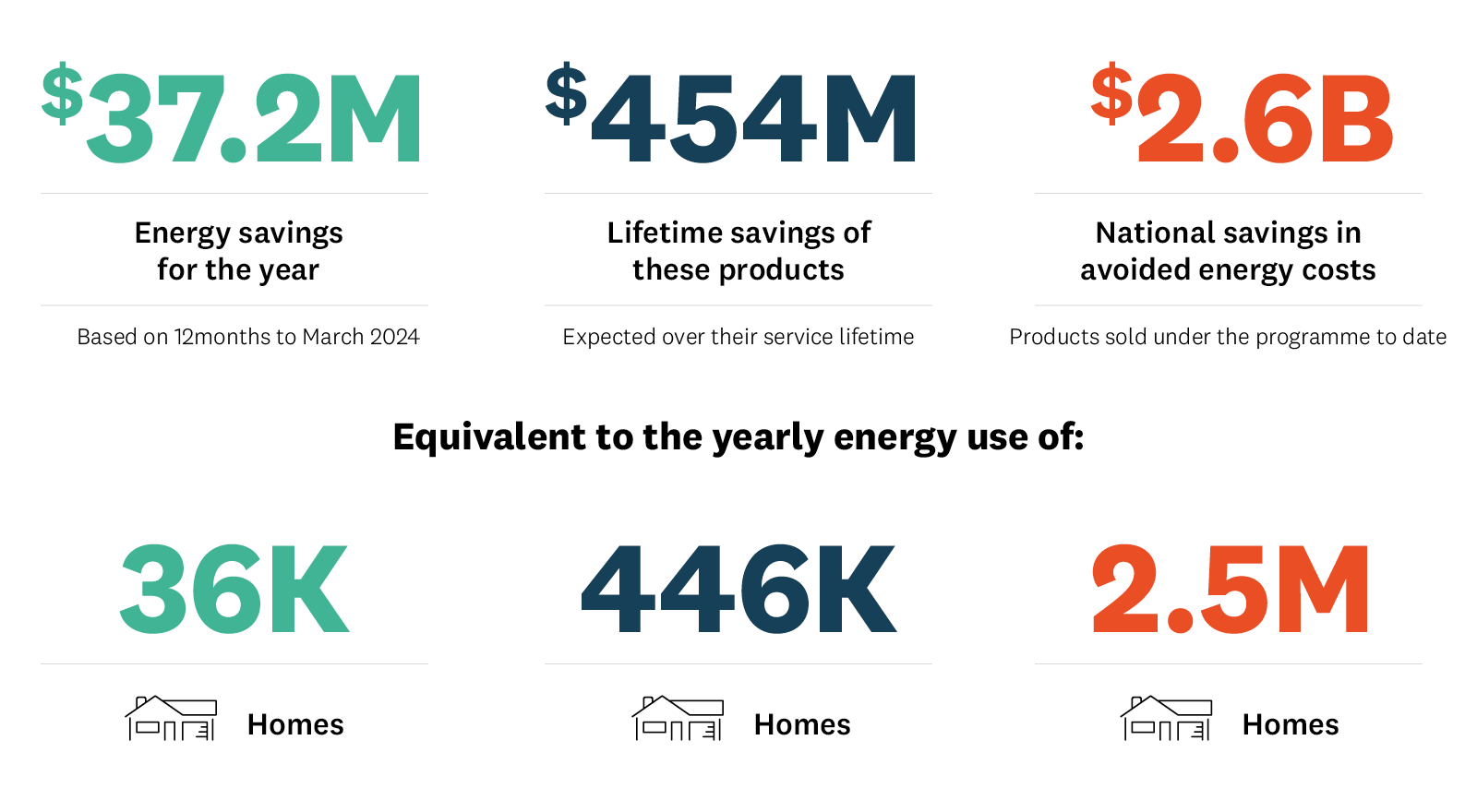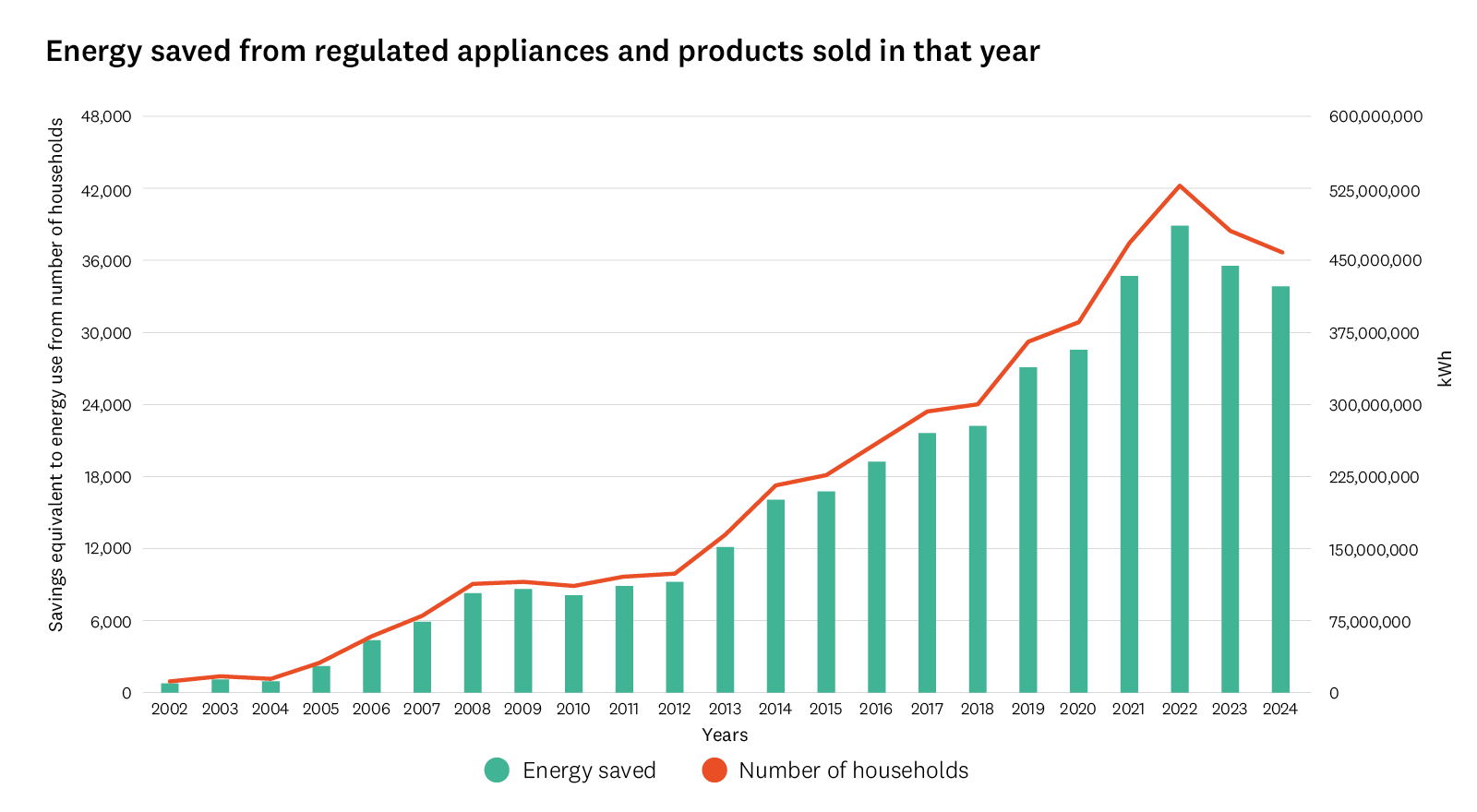How EECA regulates
We regulate energy-using products in New Zealand, under the Equipment Energy Efficiency (E3) programme. This programme ensures New Zealanders have access to the best performing products.
The Regulations are made under the Energy Efficiency and Conservation Act 2000. We collaborate closely with Australia on this work, which means we share the cost of regulation, making it easier and cheaper for businesses trading in both countries to comply. More energy efficient products help to reduce running costs for households and businesses.
More efficient appliances
The energy savings from the year ending of March 2024 are the result of continuous improvement of the products on the market - removing the worst performing models, and encouraging consumers to buy more energy efficient appliances, which are easily identified using Energy Rating Labels (Mandatory Energy Performance Labelling).
Efficiency keeps improving for regulated appliances, including washing machines, clothes dryers and dishwashers.
- In 2002, the highest rated washing machines on the market were 4.5 stars and made up less than 1% of the total sold. In the year ending March 2024, the highest rated are 4.5 or 5 stars, and make up 36% of the total sales.
- Before 2010, there were no clothes dryers above 4 stars but with more efficient heat pump technology, there are products now rated up to 10 stars. In the year ending March 2024, the clothes dryers with 6 to 10 stars (heat pump dryers) made up 47% of the sales.
- In the year ending March 2024, 80% of dishwashers sold have energy ratings of 3.5 stars or higher – compared to just 5% in 2002.
EECA data shows that more than 102 million products have been sold under E3 between 2002 and 2024, saving businesses and consumers 108.3 PJ of energy. That’s around $2.6 billion of national benefit and 3.95 million tonnes of avoided carbon emissions.
In the year to the end of March 2024, sales of energy efficient products saved New Zealand $37.2 million over the year. That is 1.53 Petajoules of energy saved this year.

The calculations
EECA calculates the annual energy and cost savings for the year by tracking improvements in the energy efficiency of products through sales and product performance information (based on avoided electricity generation calculated at $0.088 per kWh).
An International Energy Association report also highlighted the positive impacts of product energy efficiency, finding that they save households and businesses around the world billions of dollars and avoid hundreds of millions of tonnes of CO2 emissions each year. Other benefits include employment, innovation, water savings, and air quality improvements.

Sales facts
We’ve seen an overall reduction in sales this year (ending March 2024) – with 10 of the 20 product categories we regulate experiencing a decrease in sales compared to last year. This has contributed to the decrease in energy savings and national benefits comparing 2023 to 2024 ($39M vs $37.2M).
Notably, this is the second year that the sales of heat pumps dropped significantly, down 15% on last year to 205,000 units. Some of the change could be attributed to the significant increase in sales following the introduction of Healthy Home Standards in 2019, which led to an improvement in the housing stock of heat pumps. However, most of the other residential products experienced an increase in sales.
Despite the reduction in sales – the market continues to move toward more energy efficient products. For example, 47% of the clothes dryers (43,800 units) sold this year were of the heat pump type (which is the most efficient technology).
There was another 29% decrease in compact fluorescent lamps sales, and 32% decrease in linear fluorescent lamps. This decrease can be attributed to these technologies being superseded by LEDs, which are significantly more efficient.
Finding efficient appliances
Energy rating labels make it easy to compare the efficiency and running costs of similar appliances. The more stars, the more efficient the appliance is compared to a similar product of the same size.
The Gen Less efficient appliance calculator can help with easy comparison of products with energy rating labels in New Zealand.
Efficient appliance calculator | Gen Less(external link)
Saving energy at home
See how much you could save on running costs by switching to energy-efficient appliances. The new Gen Less home energy savings calculator is designed to help New Zealanders understand the impact that efficient appliances have on their energy bills.
The calculator focuses on 5 high-impact energy uses/appliances – heating, hot water, cooktops, driving and rooftop solar.
